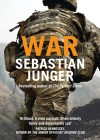War,
Written by: Sebastian Junger,
Fourth Estate, London, 2010,
ISBN 9780007362134, 286pp
Reviewed by: Major Andrew Shum
Even for the non-scholars of recent military history, there are names of places that can immediately conjure up visions of the courage, sacrifice, hardship and unbridled terror felt and endured by those operating on the ground. The quagmire of the Somme, the sweltering desert of Tobruk and the bloodied beaches of Normandy are synonymous with all of these characteristics and more. What is less readily identified are the small pockets in every conflict which draw out these same actions, feelings and emotions for the men who operated within them. More often then not, these experiences are relegated at best to a brief mention in a broad media piece or purely the memories of those who lived it. Sebastian Junger, in his raw and thought evoking novel War, breaks the mould and in doing so, tells the story of Second Platoon, Battle Company, 2nd Battalion, 503rd Parachute Infantry Regiment and their fifteen-month deployment in Afghanistan’s Korengel Valley.
The title of the book is highly appropriate and in many respects is a masterful stroke by Junger. It is sharp, unambiguous and avoids sugar coating the daily grind in the Korengel with purest counterinsurgency or humanitarian connotations and the suite of buzzwords that have accompanied the supposed ‘small war revolution’. For Junger and the men of Battle Company, little opportunity existed for anything other than fighting for survival—little opportunity existed for anything other than war. The Korengal Valley when viewed on a map by the uninformed, looks like many others in Afghanistan; however, its close proximity to Pakistan and its historical use for all forms of movement quickly identified it as a strategic location for the Coalition, al-Qaeda and the Taliban. As a result, the fighting is at times fierce, a near guaranteed daily quantity and, as fate would play out, a frequent taker of lives in an area less than ten square kilometres in size.
Junger’s credibility in bringing War to life is unquestioned. Alongside his photojournalist partner, he spent over five months on the ground with Battle Company and followed up with many of the wounded who returned back to the United States. He lived in the same small outposts, walked the same patrols, lived through the same contacts and even survived an improvised explosive device attack on his own vehicle. In many respects Junger became a part of the fabric of the platoon, and in doing so ensures the true essence of this book comes to the fore. His descriptions are vivid, from the choking heat of long summer days through to the unmistakeable snap of incoming rounds and the roller coaster of emotions after surviving an intense fire fight.
What is particularly gripping are his descriptions of the emotions of the men before, during and after combat. In many respects Junger’s journey with the men of Second Platoon is one with two objectives. Firstly, to present the true story of the men fighting in this part of Operation ENDURING FREEDOM, and secondly, to try to answer the question of why men like these willingly go into battle together and for one another. Junger’s account of the daily grind not only for the men of Second Platoon but the wider company and battalion comfortably answers the first. In answering the second, Junger takes the time to show that war, battle and the thoughts and feelings of those in this fight are not a revelation. Junger quotes studies and findings from the Second World War, more contemporary conflicts and even delves into the behaviours of our Chimpanzee brothers to show that the things that these young men at times struggle with or laugh off are age-old in both their presence and enduring effects. Ultimately his search for an answer to the question of why these men do what they do is answered by the very tenets we too hold dear: loyalty, tenacity and an overwhelming desire to not let ones’ mates down.
Noting these objectives, the true worth of War, is Junger’s blending of the two. Junger’s writing pedigree is unquestioned, having previously written the hugely successful The Perfect Storm, and as a result his descriptions match the best of contemporary war correspondents. But by going the extra step and presenting what comes after the rounds stop, the AME lifts off and the harsh cold blackness of an Afghan winter’s night envelops not only the body but the minds of those still standing, Junger ensures that the story of the men of Second Platoon is truly told, and in doing so, delivers.

